Professor Sir Munir Pirmohamed
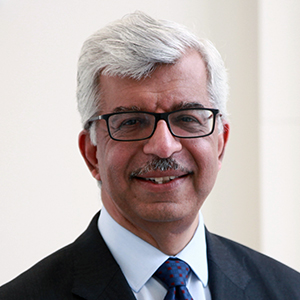
David Weatherall Chair of Medicine and NHS Chair of Pharmacogenetics
Session Chair
Professor Sir Munir Pirmohamed MB ChB, PhD, FRCPE, FRCP, FBPhS, FMedSci is David Weatherall Chair in Medicine at the University of Liverpool, and a Consultant Physician at the Royal Liverpool University Hospital. He is Director of the Centre for Drug Safety Sciences, and Director of the Wolfson Centre for Personalised Medicine. He is also Director of HDR North. He is an inaugural NIHR Senior Investigator, Fellow of the Academy of Medical Sciences in the UK, Commissioner on Human Medicines. He was President of British Pharmacological Society from January 2020 - December 2021, and is currently President of the Association of Physicians. He was awarded a Knights Bachelor in the Queen's Birthday Honours 2015. His research focuses on personalised medicine, clinical pharmacology and drug safety.
Professor Martin Rutter
Professor of Cardiometabolic Medicine, University of Manchester
Deputy Chief Scientist, UK Biobank
Talk title: UK Biobank
Martin is Professor of Cardiometabolic Medicine at the University of Manchester and Honorary Consultant Physician at the Diabetes, Endocrinology and Metabolism Centre, Manchester Royal Infirmary. His main research interest is the pathogenesis of cardiometabolic diseases such as heart disease, obesity and diabetes and digital interventions in diabetes. He has several roles with Diabetes UK including: member, Science and Research Advisory Committee (2018 onwards); and Chair, Diabetes Research Steering Group 6 (diabetes-related complications). He is a past Chair of Diabetes UK's Professional Conference Organising Committee. He has been clinical lead physician for the islet cell transplantation service and co-lead for the diabetes-renal service at Manchester University NHS Foundation Trust.
Dr Rich Scott
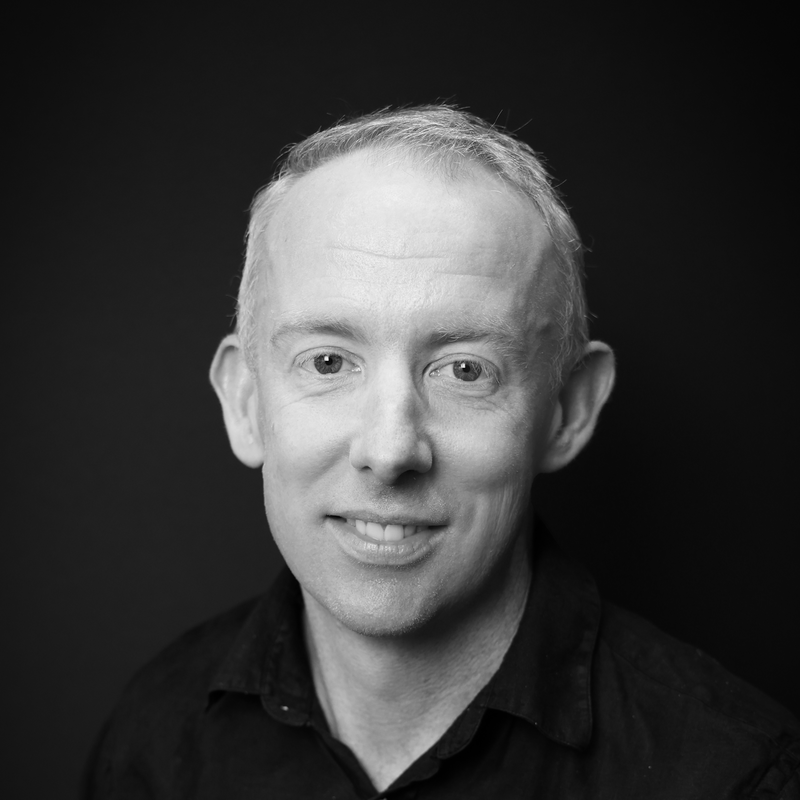
CEO at Genomics England; Honorary Consultant at GOSH
Talk title: Genomics England
Dr Richard Scott joined the organisation in 2015. He is also a Consultant and Honorary Senior Lecturer in Clinical Genetics at Great Ormond Street Hospital for Children and the UCL Institute of Child Health where his practice focuses on diagnosing children with rare multisystem disorders.
Richard trained in medicine at Cambridge University and University College London. He specialised in Paediatrics and subsequently Clinical Genetics in London and completed his PhD on childhood cancer syndromes at the Institute of Cancer Research.
Through his clinical practice and in his role at Genomics England he is passionate about harnessing the power of new genomic technologies for the benefit of patients in mainstream healthcare.
Professor Raghib Ali
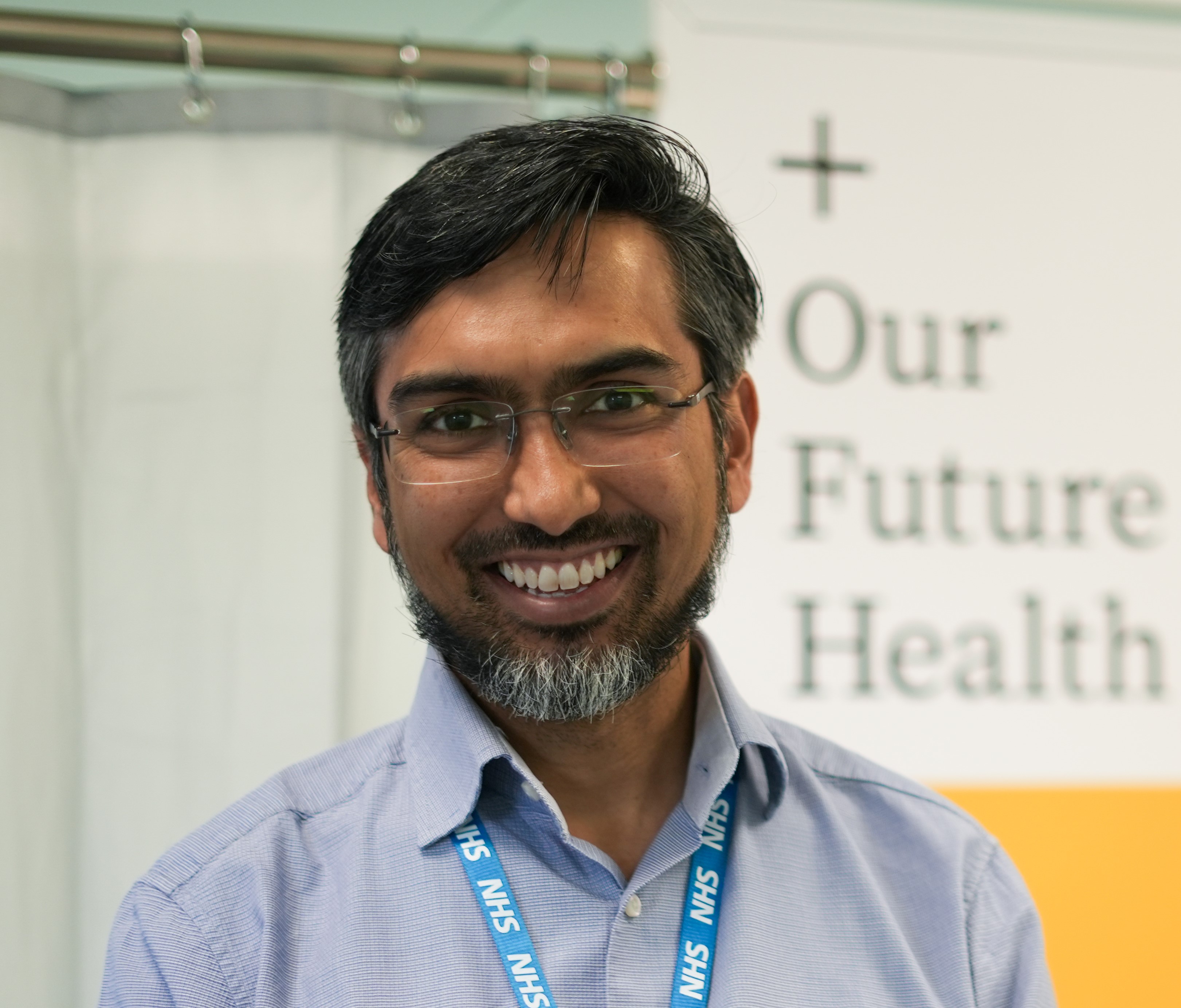
Chief Executive and Chief Medical Officer, Our Future Health
Talk title: Our future health
Professor Raghib Ali is the CEO, Chief Investigator and Chief Medical Officer of Our Future Health; a Clinical Epidemiologist at the University of Cambridge; a Consultant in Acute Medicine at the Oxford University Hospitals NHS Trust; and Honorary Consultant with the Office for Health Disparities and Improvement.
He graduated from Cambridge University and has been awarded postgraduate degrees in Epidemiology and Public Health from the Universities of London, Cambridge and Oxford and is a Fellow of the Royal College of Physicians. He has been involved in population health research since 2004 nationally and globally, working firstly on UK Biobank, then leading studies of cancer incidence by ethnic group in England and India from 2005 to 2013 and established the UAE Healthy Future Study, in 2014, for which he is the principal investigator.
He was awarded an OBE in the Queen's Birthday Honours 2022 for services to the NHS and the Covid-19 response and elected as an Honorary Fellow in the Faculty of Public Health, 'the highest accolade the Faculty can bestow and is awarded to those who have given exceptional service to the science, literature or practice of public health' in April 2023.
Professor Rosalind Smyth CBE

Professor of Child Health, University College London
Session Chair
Professor Rosalind Smyth CBE is Vice Dean (Research) of the Faculty of Population Health Sciences and Honorary Consultant Respiratory Paediatrician at Great Ormond Street Hospital. From 2012-2022 she was Director of the UCL Great Ormond Street Institute of Child Health, and also served as Non-Executive Director of Great Ormond Street Hospital NHS Foundation Trust. She has been appointed Vice President (Clinical) of the UK's Academy of Medical Sciences from 2023-2027. She is chair of the MRC's Training and Careers Group, Governor of the Health Foundation and Trustee of the Medical Research Foundation and The Lister Institute. She is a member of the Board and Scientific Advisory Group of the International Centre for Diarrhoeal Diseases Research, Bangladesh. Her current research interest include clinical studies of viral/host interactions in RSV bronchiolitis, clinical trials and systematic reviews of treatments for childhood respiratory disease.
Additionally, Smyth has been involved in drug regulation in an advisory capacity and has chaired the Paediatric Expert Advisory Group of the Commission on Human Medicines (2002-2013) and served as a member of CHM (2009-2013). She was awarded CBE in the Queen's New Year's Honours 2015, for service to the regulation of medicines for children. She graduated in medicine from Clare College, Cambridge and University of London and trained in paediatrics in London, Cambridge and Liverpool.
Dr Pamela Bowman

Senior Clinical Lecturer and SpR in Clinical Genetics
, University of Exeter Medical School; Royal Devon University Healthcare NHS Trust
Talk title: Sulphonylurea therapy in iDEND syndrome: genetic diagnosis enables precision treatment for neonatal diabetes and neurodevelopmental disorders
Pam Bowman is a Senior Clinical Lecturer and SpR in Clinical Genetics at the University of Exeter Medical School / Royal Devon University Healthcare NHS Trust. She spends 50% of her time undertaking research and 50% of her time as a clinician.
Pam completed her undergraduate medical training at Cambridge University (MA) and Imperial College London (MBBS). She held NIHR Academic Clinical Fellowships in Paediatrics (MRCPCH) then Psychiatry (MRCPsych) prior to starting her career in Clinical Genetics. She completed an MSc in genomic medicine in 2019 and a Diabetes UK funded PhD in 2020 with Professor Hattersley’s monogenic diabetes research team, and has 20 peer reviewed publications to date.
She is an expert in the neurodevelopmental phenotypes and treatment response in individuals with neonatal diabetes due to genetic variants in potassium channel genes, and led the development of a national highly specialised clinical service in Exeter for affected individuals.
Pam is chief investigator and co-investigator on 2 recently awarded Exeter BRC small project grants and is also leading an international study of the effects of early sulphonylurea treatment on neurodevelopment in neonatal diabetes.
Dr Hannah Nieto

Clinical Scientist, Department of Metabolism and Systems Science, University of Birmingham
Talk title: Genomic diagnostics in Thyroid Cancer
Hannah Nieto has recently been appointed as a Clinician Scientist on a BHP Fellowship at the University of Birmingham. Hannah is a Head and Neck and Thyroid surgeon, trained in Otorhinolaryngology (ENT surgery) in the West Midlands, and is currently undertaking a clinical Advanced H&N fellowship at the Manchester Royal Infirmary. Academically Hannah is working in the field of thyroid molecular genomics, with an interest in thyroid cancer and bioinformatics. Hannah delivers modules on statistics and bioinformatics at UoB for intercalated students and supervises iMSc Anatomy students, coaching them through performing systematic reviews and metanalyses. Her PhD was completed in the molecular biology of thyroid cancer recurrence, encompassing programming and wet lab discovery science. Hannah sits on the national ENT NIHR CRN. Her research focus now is genetics in diagnostics and prognostics in thyroid cancer.
Dr Antonio Pardinas
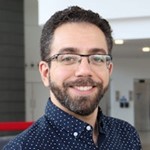
Reader, Division of Physiological Medicine and Clinical Neurosciences, Cardiff University
Talk title: Can pharmacogenomic markers improve clozapine prescribing? Some answers from the CLOZUK cohort of people with treatment-resistant schizophrenia
My research is based around the role of genetic factors in the development of psychiatric disorders. Within the
Centre for Neuropsychiatric Genetics and Genomics, I work with Professor
James Walters and others on treatment-resistant schizophrenia (TRS), widely recognised as the most impairing form of this disorder and a significant global contributor to years lived with disability. I am a member of the
Psychosis Research Theme and collaborate frequently with the
Schizophrenia Working Group of the Psychiatric Genomics Consortium. I am also involved in the development of the
CRIS system with NCMH and Cardiff and Vale University Health Board.
Dr Shirley Hopper
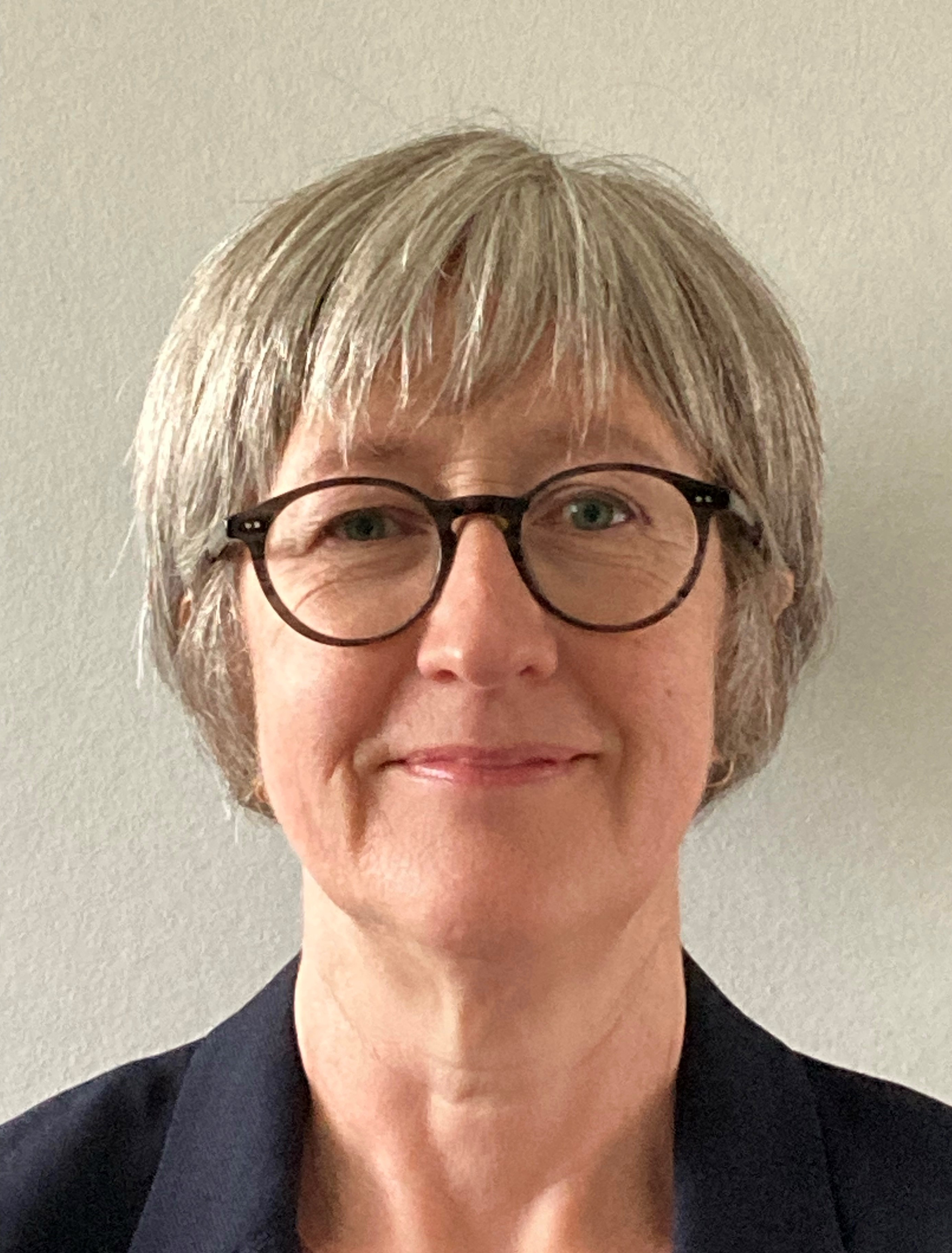
Medical Assessor, Biological Products, Medicines and Healthcare products Regulatory Agency
Talk title: Challenges and progress with the regulation of highly personalised therapies
Shirley Hopper trained as a GP and has 16 years of experience in medicines regulation at the MHRA. As a member of the Pharmacogenomics Working Party at the EMA, Shirley contributed to European scientific guidelines on pharmacogenomics, and she retains a special interest in this topic. Shirley leads the drafting group that is developing MHRA guidance on individualised mRNA cancer immunotherapies.
Allison Watson
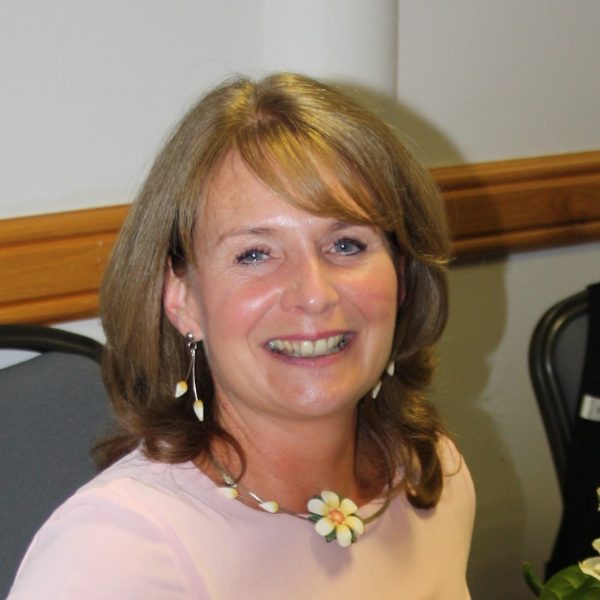
CEO and Cofounder,
Ring20 Research and Support
Talk title:
Living rare...from parent to protagonist, advocate to activist
I live in the UK and have an adult son, David with Ring Chromosome 20 Syndrome, [ r(20)] – an ultra-rare form of epilepsy. I co-founded Ring20 Research and Support UK CIO in 2014, to provide mutual support and information on r(20) syndrome to individuals, families and healthcare professionals who are affected by or come into contact with r(20). We currently support over 120 families worldwide, approx. 60% of the reported patient population and our community is constantly growing, despite evidence that diagnostic rates are in decline as a direct consequence of advancements in next generation sequencing.
I was co-lead for the European Patient Advocacy Group) ePAG for EpiCARE ERN, the European Reference Network for rare and complex epilepsies and have been a programme manager at Rare Diseases International for the Collaborative Global Network for Rare Diseases [CGN4RD]. In 2021 I founded the UK Rare Epilepsies Together [UKRET] network – a collaboration between epilepsy patient support groups and charities across the UK supporting families affected by rare and complex epilepsies, to see how we might work STRONGER TOGETHER to improve diagnosis, treatment and care at a national level.
Due to a career change I now dedicate my time (mostly on a voluntary basis) supporting patients and their families affected by rare and complex epilepsies, speaking at public events and generally raising awareness. I am passionate about improving outcomes and am constantly seeking practical solutions and information to help families manage their condition on a day-to-day basis, alongside trying to raise funds for vital research.
We may not have effective treatments TOMORROW, but I believe it is how we live our lives TODAY that matters and how we learn to cope.
Jack Johnson

Talk title: A patient perspective on #TimeIsMuscle
Professor Carlo Rinaldi

Professor of Molecular and Translational Neuroscience and Director of Graduate Studies in the Department of Paediatrics, University of Oxford
Talk title: Unlocking Potential: A Scalable Framework for Genetic Therapies in Rare Neurological Disorders’
Carlo Rinaldi is Professor of Molecular and Translational Neuroscience and Consultant Neurologist at the University of Oxford. He completed his medical education and residency in Neurology in 2010 at the University of Federico II (Naples, Italy). In 2009 he joined the Neurogenetics Branch at the National Institute of Health (Bethesda, MD, USA) under the supervision of Prof. Fischbeck, to work on the mechanisms of pathogenesis of spinal and bulbar muscular atrophy (SBMA) and other genetic neurological diseases. After obtaining a Ph.D. in Neuroscience, in 2015 he moved to Oxford as a Clinical Research Fellow under the mentorship of Prof. Matthew Wood. In 2017 Carlo received a Career Development Fellowship by the Wellcome Trust and a Career Development Award by the Muscular Dystrophy Association and in 2024 was awarded an UKRI MRC Senior Clinician-Scientist Fellowship. He is an Honorary Consultant Neurologist at the John Radcliffe Hospital in Oxford and at the National Hospital for Neurology and Neurosurgery in London. His lab focuses on preclinical and clinical development of genetic therapies for rare neurological diseases.
Professor Bobby Gaspar
Honorary Clinical Professor, University College London
Talk title: Gene therapy for rare diseases: opportunities and challenges
Bobby is a world-renowned scientist and physician and accomplished strategic and organizational leader with more than 25 years of experience in medicine and biotechnology. He is co-founder and chief executive officer of Orchard Therapeutics, a global gene therapy leader recently acquired by Kyowa Kirin with the goal of accelerating the delivery of new gene therapies to patients around the globe. Bobby has been a pioneer in gene therapy and the evolution of hematopoietic stem cell (HSC) gene therapy technology—including some of the first studies in patients with severe primary immune deficiencies—bringing it from some of the first studies in patients into late-stage clinical trials. His unparalleled expertise and deep relationships with key physicians and treatment centers around the world are integral to Orchard’s efforts to identify patients with metachromatic leukodystrophy (MLD) and other severe genetic conditions through targeted disease education, early diagnosis and comprehensive newborn screening.
Bobby is an honorary professor of pediatrics and immunology at the UCL Great Ormond Street Institute of Child Health and has led multiple clinical trials that have shown that gene therapy can successfully correct the genetic defect in immune deficiencies. He studied medicine and surgery at Kings College in London before completing his Ph.D. at the UCL Great Ormond Street Institute of Child Health
.
Ruben Rizzi
.jpg)
Senior Vice President, Global Regulatory Affairs, BioNTech
Talk title: Individualized mRNA vaccines: experience with the iNeST platform, regulatory considerations, and more
Ruben Rizzi, physician by training, SVP of Global Regulatory Affairs at BioNTech. I joined the company in December 2019 just before the pandemic, and I have been the global regulatory lead for BioNTech for our COVID-19 development. Currently, I am still supporting the lifecycle of our COVID-19 vaccine, and I am co-leading the Global Regulatory Affairs department at BioNTech and working closely with the teams that are responsible for the development of BioNTech´s pipeline, post-approval activities and labelling for all infectious diseases, rare diseases and immuno-oncology candidates.
Professor Peter Johnson

Professor of Medical Oncology, University of Southampton
Talk title: Cancer precision medicine in the NHS
Peter Johnson is Professor of Medical Oncology at the University of Southampton, National Clinical Director for Cancer at NHS England and Chair of the UK Office for Life Sciences cancer goal. His work at NHSE covers the range of policy aimed at improving cancer survival, particularly the earlier and faster diagnosis of cancer, as well as its treatment.
He was previously Chief Clinician for Cancer Research UK from 2008 to 2017. His research interests are in applied immunology and immunotherapy; lymphoma biology and precision medicine, early cancer detection biomarkers and clinical trials




